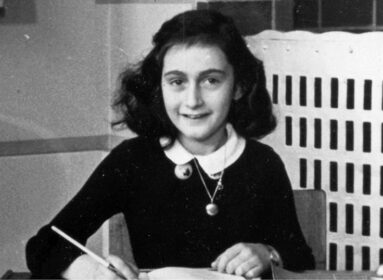
By Cindy Mindell
 Alexis Semevolos credits Glastonbury High School chorus director Dr. Ethan Nash with unintentionally preparing her for the Yiddish singing role she recently landed in a New York musical production.
Alexis Semevolos credits Glastonbury High School chorus director Dr. Ethan Nash with unintentionally preparing her for the Yiddish singing role she recently landed in a New York musical production.
Semevolos, 22, is an ensemble member in The Golden Bride (Di Goldene Kale — pronounced ‘kallah’), produced by the National Yiddish Theatre Folksbiene (NYTF) at the Museum of Jewish Heritage. A smash hit when it debuted in 1923 at Kessler’s Second Avenue Theater in Manhattan, the Yiddish-American operetta is enjoying its first revival in 70 years.
“In high school, we sang a lot in Russian, Hebrew, and German,” says Semevolos, who earned a BA in musical theater at the Hartt School of the University of Hartford in 2014. “Yiddish is similar but I’m not very experienced in the language. For the audition, I was given a Yiddish song and had three days to learn it.”
The rags-to-riches American-Jewish fairytale follows Golde, abandoned by her parents and raised by poor innkeepers in a shtetl somewhere in the Russian Empire. An uncle tracks her down with the news that she has come into her father’s fortune, but must sail to New York to claim her inheritance and find her mother. She sets out, accompanied by several neighbors from the shtetl and a parade of would-be suitors. With music by famed Yiddish composer Joseph Rumshinsky, Di Goldene Kale was one of the most popular operettas of the Roaring Twenties, first staged when New York was home to 15 Yiddish theaters.
After its initial 25-year run in the U.S. and abroad, The Golden Bride was lost during World War II, its libretto and score split up among several archives. In 1983, scholar Michael Ochs stumbled across a manuscript of the operetta while working as the head of the Loeb Music Library at Harvard. Ochs transliterated the Yiddish libretto (by Frieda Freiman; lyrics by Louis Gilrod) and restored the original score. NYTF opened its production on Dec. 2 with a 20-member cast and a 14-piece orchestra.
Semevolos plays a maid and a girl in the shtetl.
“It’s the craziest thing I’ve ever done,” she says. “I never thought in a million years that I’d be doing a show in Yiddish. It’s been an incredible experience. The music is beautiful, the leads’ singing is gorgeous, and I love the parts that I get to sing in the ensemble.”
Semevolos, who was raised Catholic, has learned a lot about Jewish culture as part of the rehearsal process. Music director Zalmen Mlotek hosted a Friday night Shabbat dinner for the cast, a first for Semevolos.
“There’s a big scene in the operetta where we’re doing kiddush and Shabbes dinner and when I first read the libretto, I didn’t understand it,” she says. “I didn’t know if it was something super-serious where my character should be stoic or if she should be happy. So I was able to find out what my character would feel in that moment, based on what the meal actually was. It’s been really lovely to be welcomed into a new culture and community that I hadn’t known much about.”
A romantic comedy, Di Goldene Kale was written after some two million eastern European Jews had found safe haven in the U.S., at a time when new laws were restricting further Jewish immigration. Golde’s experiences reflected those of the audience-members who packed the early performances.
“The show is a lot about the Jewish immigrant experience – how people love their new country but also have a yearning for the past,” says Semevolos. “I think it illustrates the optimism and uncertainty that come with starting a new life – whether it’s immigrating or going to school or starting a new job or moving – but also loving where you came from and knowing your roots and what you’ve been through, and being able to move forward and take that with you.”
The Golden Bride runs through Jan. 3, 2016. For more information: nytf.org, (212) 213-2020







 Southern New England Jewish Ledger
Southern New England Jewish Ledger















